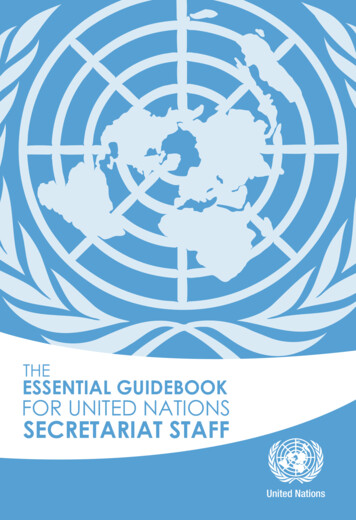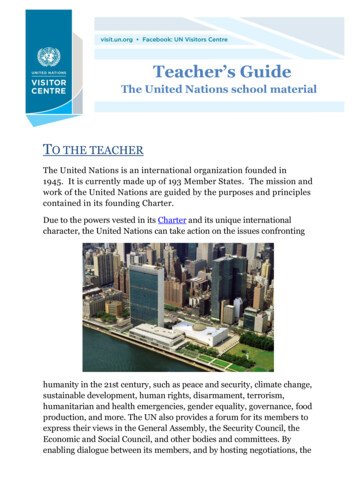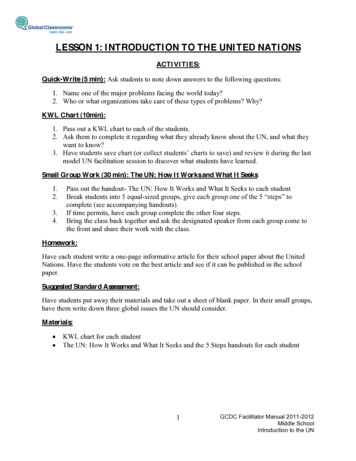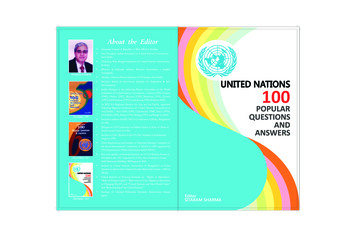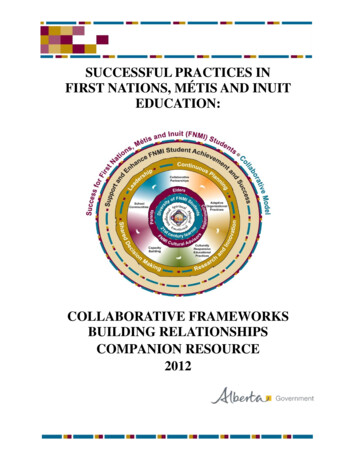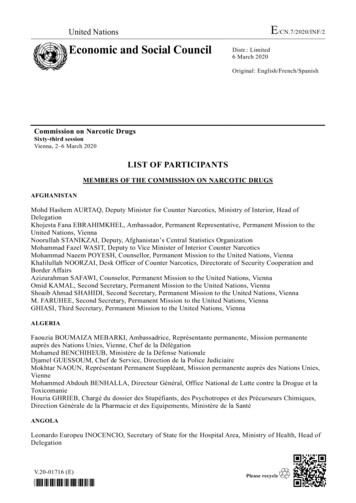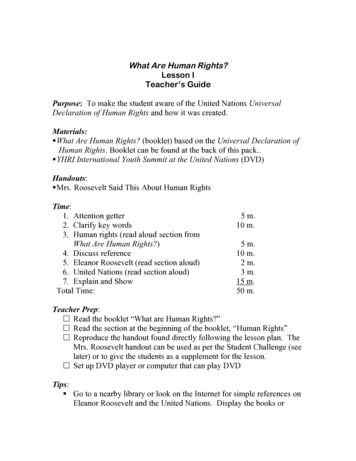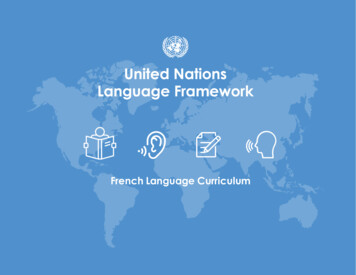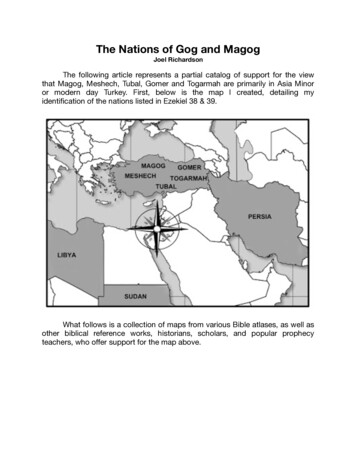
Transcription
The Nations of Gog and MagogJoel RichardsonThe following article represents a partial catalog of support for the viewthat Magog, Meshech, Tubal, Gomer and Togarmah are primarily in Asia Minoror modern day Turkey. First, below is the map I created, detailing myidentification of the nations listed in Ezekiel 38 & 39.What follows is a collection of maps from various Bible atlases, as well asother biblical reference works, historians, scholars, and popular prophecyteachers, who offer support for the map above.
IVP Atlas of Bible HistoryThe New Moody Atlas of the Bible
The Holman Bible AtlasZondervan Atlas of the Bible
ESV Bible AtlasHarper Collins Atlas of Bible History
Baker’s Bible AtlasThe Macmillan Bible Atlas
IVP New Bible Atlas The Oxford Bible Atlas says of Meshech and Tubal are, “regions in Asia Minor[Turkey].” The Zondervan Illustrated Bible Dictionary states, “Magog, possibly meaning‘the land of Gog,’ was no doubt in Asia Minor [Turkey] and may refer to Lydia.” The IVP Bible Background Commentary lists Magog, Meshech, Tubal, andTogarmah as “sections or peoples in Asia Minor” [Turkey]. The New Unger’s Bible Dictionary, under the entry for “Magog,” states, “It isclear that Lydia [Turkey] is meant, and that by ‘Magog,’ we must understand,‘the land of Gog.’” The Zondervan Illustrated Bible Backgrounds Commentary places Magog inAnatolia, or modern-day Turkey. The New Bible Dictionary places both Meshech and Tubal in Turkey. The Catholic Encyclopedia states, “It seems more probable that . . . Magogshould be identified with Lydia [Turkey]. On the other hand, as Mosoch andThubal were nations belonging to Asia Minor, it would seem from the text ofEzechiel that Magog must be in that part of the world. Finally, others withJosephus identify Magog with Scythia, but in antiquity this name was used todesignate vaguely any northern population.”
Herodotus, a Greek historian who wrote roughly one hundred and fifty yearsafter Ezekiel, never once mentions “Magog”, but does discuss the Scythianpeoples quite extensively. If one agrees with first century historian Josephusthat some or all of the Scythian tribes are from Magogites, then Herodotusprovides another Turkish-Magog connection. For after discussing the varioustheories for the origins of the Scythians, Herodotus expresses his preferredbelief that they came from Turkey: “There is also another different story, nowto be related, in which I am more inclined to put faith than in any other. It isthat the wandering Scythian once dwelt in Asia [The Greeks of this timereferred to Asia Minor simply as “Asia” thus modern day Turkey].” Thus,Herodotus placed the origin of the Scythians in Turkey. By Herodotus’ dayhowever, the Scythians had begun their sweep north on either side of theBlack Sea, but had barely entered into Russia. As historian MichaelKulikowski, Department Head of History at Penn State University, states,“Herodotus’ Scythians were to be found in a bit of modern Bulgaria andRomania, and across the grasslands of Moldova and Ukraine.” This point isessential: In Herodotus’ day, one hundred and fifty years after Ezekiel’s oracle,the Scythians had barely reached southern Russia. Herodotus’ recordestablishes that back in Ezekiel’s day, the Scythians still dwelt in Asia Minor,or modern day Turkey. Concerning Meshech and Tubal, Herodotus, also identified them with apeople named the Sarmatians and Mushovites who lived at that time in theancient province of Pontus in northern Asia Minor, South East of the BlackSea [Histories IV], again pointing to modern Turkey. Hippolytus of Rome, one of the most important Christian theologians of thethird century, in his Chronicon, connected Magog to the Galatians in AsiaMinor, modern-day Turkey. Pliny the Elder a first-century Roman military commander, author, naturalist,and philosopher placed Magog on the border of Syria and modern dayTurkey. Maimonides, also known as Rambam, the revered Jewish sage, in HichotTerumot, also identified Magog as being on the border of modern day Turkey. Ralph Alexander, Old Testament scholar, in the Expositor’s Bible Commentarysays, “Meshech and Tubal refer to areas in eastern Turkey, southwest ofRussia and northwest of Iran.”
Daniel I. Block, Old Testament scholar, in the New International Commentaryon Ezekiel, says, “It seems best to interpret Magog as a contraction of anoriginal māt Gūgi, ‘land of Gog,’ and to see here a reference to the territory ofLydia in western Anatolia [Turkey].” Edwin Yamauchi, scholar and historian places both Meshech and Tubal inmodern day Turkey. Dr. Michael Heiser, scholar in residence for Logos Bible software, in several ofhis works, both written and podcast, repeatedly emphasizes the location ofthe Gog Magog coalition in Asia Minor, and not Russia. Mark Hitchcock, pastor, author and well-known prophecy teacher, placesMeshech and Tubal in modern day Turkey. Tim Lahaye and Ed Hindson in their Encyclopedia of Popular BibleProphecies, also place both Meshech and Tubal in Turkey. Ron Rhodes, author and teacher in his book, Northern Storm Rising alsoplaces Meshech and Tubal in Turkey. Dr. Thomas Ice, executive director of the Pre-Trib Research Center says,“Some Bible teachers in the past have taught that Meshech is a reference toMoscow and thus refers to Russia. This is the view of The Scofield ReferenceBible, Harry Rimmer and Hal Lindsey The identification of Meshech withMoscow is merely based upon a similarity of sound. There is not real historicalbasis to support such a view, therefore, it must be rejected.” Ice thus agreeswith Hitchcock and places Meshech and Tubal in Turkey: “The historicalrecord, as was the case with Meshech, is that Tubal and his descendantsimmigrated to the area southeast of the Black Sea in what is modern dayTurkey. Meshech and Tubal clearly provide the population base for the countrywe now call Turkey.” Chuck Missler in his article, “Meshech-Tubal Tensions with Syria” also placesMeshech and Tubal in modern day Turkey. Assyrian texts & monuments locate Meshech (Mushku) and Tubal (Tabal) inAnatolia (W.Turkey), the areas that became known as Phrygia andCappadocia.What follows are some sources which DO NOT support an Ezekielianunderstanding of Magog as Russia, but which are commonly cited on theinternet as if they did. The following three claims in particular are floating around
the internet and have been repeated many times, obviously without anyone everchecking the original sources: Hesiod: The claim is that Hesiod, in the 7th Century B.C. linked Magog to theScythians and southern Russia. This is entirely inaccurate. Hesiod mentionsMagog as the real name of Prometheus who lived “near the Caucasus”.Nothing of the Scythians or Russia is ever mentioned by Hesiod in regard toMagog. Philo: Another claim holds that Philo in the first century, linked Magog toRussia. I have found this claim in more than one popular prophecy book. Thisalso is a fabricated claim. In all of the works of Philo, he never mentionsMagog. There is however, a work called Pseudo-Philo, which mentionsMagog, but only as a descendant of Noah. Nowhere does Pseudo-Philo evermake any connection between Magog and Russia, or any other location forthat matter. Herodotus: The third claim is that Herodotus makes references to a peoplecalled “the Gargarians” who lived in or near Russia. No such reference existsin any of Herodotus’ works. Herodotus does make two references to a peoplecalled “Gandarians” but they are said to have lived in “Asia” which was theterm Herodotus used to refer to Asia Minor, or modern day Turkey. Where the false claim above derives from may be a reference found in theworks of Strabo, a Greek historian, geographer and philosopher from the firstcentury. Strabo spoke of an all male tribe called the Gargaeans who wouldonce a year mate with the Amazons (a tribe of all women). The two lived onthe south of the Caucasian mountains in what would be Turkey, Georgia orAzerbaijan. Strabo lived roughly six hundred years after Ezekiel. Once more,despite its obviously mythological nature, this story does nothing to establishan Ezekielian understanding of Magog as Russia.Despite the overwhelming evidence, many Christians still hold to thepopular view that Ezekiel was speaking of Russia. Of course, this debate is notnew. As far back as 1706, Matthew Henry, in his classic Bible commentary,acknowledged this precise difference of opinion among fellow scholars andbelievers: “Some think they find them [Gog and Magog] afar off, in Scythia,Tartary, and Russia. Others think they find them nearer the land of Israel, inSyria, and Asia the Less [Turkey].”When one surveys the many efforts to equate Magog with Russia, theyalmost universally follow the method which attempts to track the blood lines, thelineage, intermingling and migration patterns of the sons of Magog throughout
the centuries. This often becomes chaotic, produces a wide-range of views, andis somewhat impossible for the lay-student to wade through all of the numerousopinions down throughout the centuries. As an example of how absurd thismethod can become: if one traces the bloodlines and migration patterns of theGomerites, they eventually become the Celts who came to settle Ireland,England, Scotland etc. Yet how many books have we seen that predict an Irishinvasion of Israel?The historical-grammatical method simply seeks to understand howEzekiel the prophet would have understood the terms Magog, Meshech andTubal, etc. This would have been formed through the location of these peoplesduring Ezekiel’s day as well his familiarity with the Table of Nations found inGenesis 10 & 11. Simply stated, Ezekiel would have understood Magog to beequated with Asia Minor in the region of modern day Turkey.
IVP New Bible Atlas The Oxford Bible Atlas says of Meshech and Tubal are, “regions in Asia Minor [Turkey].” The Zondervan Illustrated Bible Dictionary states, “Magog, possibly meaning ‘the land of Gog,’ was no doubt in Asia Minor [Turkey] and may refer to Lydia.” The IVP Bible Background
